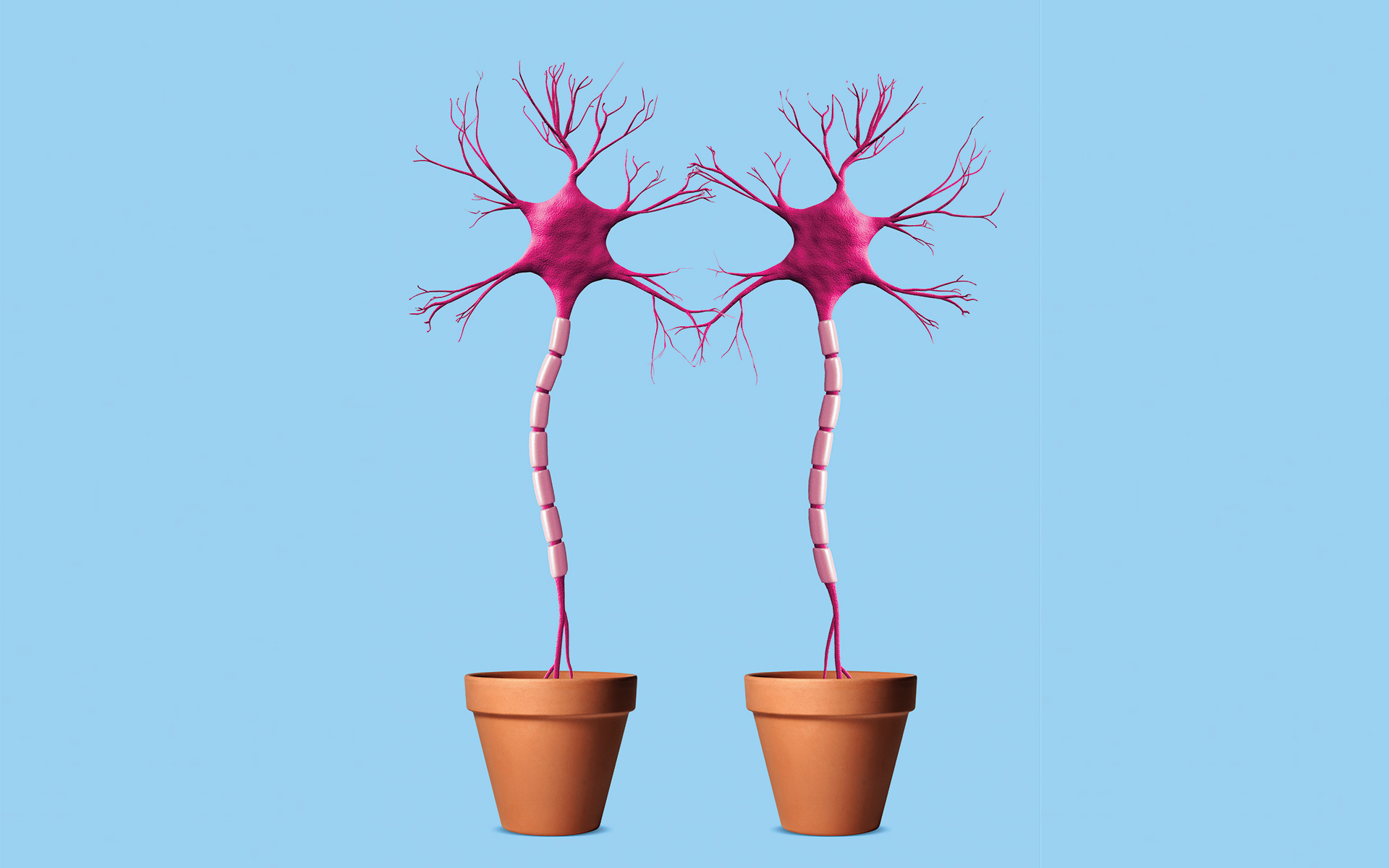We humans are a social species. We live in groups. We take care of one another. Part of being a social species, it turns out, is that we regulate one another’s body budgets. Your body budget is your brain’s accounting of the bodily resources (like water, salt, glucose, and so on) it has to spend and save. Each action that spends resources, such as swimming or running, is like a withdrawal from your account. Actions that replenish your resources, such
as eating and sleeping, are like deposits. Your brain tries to predict and meet your biological needs before they arise, to balance your body budget proactively.
The people around you influence your body budget and even rewire your brain. Your brain changes its own wiring after new experiences, a process called plasticity. For example, microscopic parts of your neurons, called dendrites, become bushier, and their associated neural connections become more efficient. This remodeling job requires energy from your body budget, so your brain needs a good reason to splurge. And a great reason is that the neural connections are used frequently to deal with the people around you. Little by little, your brain tunes itself as you interact with others.
Our Brains Are Like Dance Partners
Mutual body budgeting has measurable effects. Changes in one person’s body often prompt changes in another person’s body, whether the two are romantically involved, just friends, or strangers meeting for the first time. When you’re with someone you care about, your breathing can synchronize, as can the beating of your hearts, whether you’re in casual conversation or a heated argument. This sort of physical connection happens between infants and their caregivers, between therapists and their clients, and among people taking a yoga class or singing in a choir together. We often mirror each other’s movements in a dance that neither of us is aware of and that is choreographed by our brains.
We also adjust each other’s body budgets by our actions. If you raise your voice, or even your eyebrow, you can affect what goes on inside other people’s bodies, such as their heart rate or the chemicals carried in their bloodstream. If your loved one is in pain, you can lessen her suffering merely by holding her hand.
It may seem obvious that loving relationships are good for us, but studies show that the benefits go beyond what common sense would suggest. If you and your partner feel that your relationship is intimate and caring, that you’re responsive to each other’s needs, and that life seems easy and enjoyable when you’re together, both of you are less likely to get sick. If you’re already sick with a serious illness, such as cancer or heart disease, you’re more likely to get better. These studies were conducted on married couples, but the results appear to hold for close friendships too, and even for pet owners. However, our social nature also carries some disadvantages. We also get sick and die earlier when we persistently feel lonely—possibly years earlier, based on the data. Without someone else helping to regulate our body budgets, we bear an extra burden.
The best thing for your nervous system is another human. The worst thing for your nervous system is also another human.
A surprising disadvantage of shared body budgeting is its impact on empathy. When you have empathy for people who are familiar to you, your brain efficiently predicts their inner struggles. But when people are less familiar to you, it can be harder to empathize. You might have to learn more about the person, meaning more withdrawals from your body budget, which can feel unpleasant. This may be one reason why people sometimes fail to empathize with those who look different or believe different things than they do, and why it can feel uncomfortable to try.
A Manner of Speaking
We also regulate each other with words. A kind word may calm you, as when a friend gives you a compliment at the end of a hard day. A hateful word from a bully may cause your brain to predict threat and flood your bloodstream with hormones, squandering precious resources from your body budget. Right now, I can text the words “I love you” from the United States to my close friend in Belgium, and even though she cannot hear my voice or see my face, I will change her heart rate, her breathing, and her metabolism. Or someone could text something ambiguous to you like, “Is your door locked?” and odds are that it would affect your nervous system in an unpleasant way. These effects might not last long, but research shows that we all can tweak one another’s nervous systems quickly with mere words.
In my research lab, for example, we ask participants to lie still in a brain scanner and listen to short descriptions of situations, like this one: You are driving home after staying out drinking all night. The long stretch of road in front of you seems to go on forever. You close your eyes for a moment. The car begins to skid. You jerk awake. You feel the steering wheel slip in your hands.
As our participants listen to these words, we see increased activity in regions of their brain that are involved in movement even though their bodies are lying still. We see other activity in regions involved in vision, even though their eyes are closed. And here’s the coolest part: There’s also increased activity in the brain system that controls heart rate, breathing, metabolism, the immune system, hormones, and other internal gunk and junk…all from processing the meanings of words!
Why do the words you encounter have such wide-ranging effects inside you? Because many brain regions that process language also control the insides of your body, including major organs and systems that manage your body budget. These brain regions, which are contained in what scientists call the “language network,” guide your heart rate up and down. They adjust the glucose entering your bloodstream to fuel your cells. They change the flow of chemicals that support your immune system. The power of words is not a metaphor. It’s in your brain wiring.
Sticks and Stones
How far can these effects go? For example, can words be harmful to your health? In small doses, not really. When someone says things you don’t like or insults you or even threatens your physical safety, you might feel awful as your body budget is taxed in that moment, but there’s no physical damage to your brain or body.
But if you are stressed over and over and over again, without much opportunity to recover, the effects can be far graver. Chronic stress does more than just make you miserable in the moment. Over time, anything that contributes to chronic stress can gradually eat away at your brain and cause illness in your body. This includes physical abuse, verbal aggression, social rejection, severe neglect, and the countless other creative ways we social animals torment one another.
Simply put, a long period of chronic stress can harm a human brain. Scientific studies are absolutely clear on this point. When you’re on the receiving end of sustained verbal aggression, for example, studies show that you’re more likely to get sick. These studies of verbal aggression tested average people across the political spectrum, left, right, and center. If people insult you, their words won’t hurt your brain the first time, or the second, or maybe even the twentieth. But if you’re exposed to verbal aggression continually for months and months, or if you live in an environment that persistently and relentlessly taxes your body budget, words can indeed physically injure your brain. Not because you’re weak, but because you’re a human. Your nervous system is bound up with the behavior of other humans, for better or for worse.
When you have empathy for people who are familiar to you, your brain efficiently predicts their inner struggles. But when people are less familiar to you, it can be harder to empathize.
This situation leads us to a fundamental dilemma of the human condition. The best thing for your nervous system is another human. The worst thing for your nervous system is also another human. How, then, can we best respect each other as individuals (who often disagree) when we are social animals who regulate one another’s nervous systems to survive? I think it comes down to this: Freedom always comes with responsibility. We are free to speak and act, but we are not free from the consequences of what we say and do. We might not care about those consequences, or we might not agree that those consequences are justified, but they nonetheless have costs that we all pay. It’s up to each of us to choose to be the kind of person who makes more deposits into other people’s body budgets than withdrawals.
READ MORE
The Magnificent, Mysterious, Wild, Connected and Interconnected Brain
Our brain is like a wild, raging electrical storm that wondrously enables us to make our way. Yet a lot of mindfulness literature makes it sound like a very simple machine. Two leading neuroscientists suggest better ways to think and talk about the brain and the mind.
Read More
How Your Brain Falls for the Wrong Ideas
Our own cognitive biases, combined with a fast-paced chaotic environment, wear down our ability to discern false narratives from facts. Amishi Jha explains the science on how to shift away from divisiveness and boost your brain’s resilience.
Read More
Your Brain Predicts (Almost) Everything You Do
Cutting-edge neuroscience shows that your brain isn’t built for thinking—it’s made to predict your reality, and you have more power over that perception than you might think.
Read More










